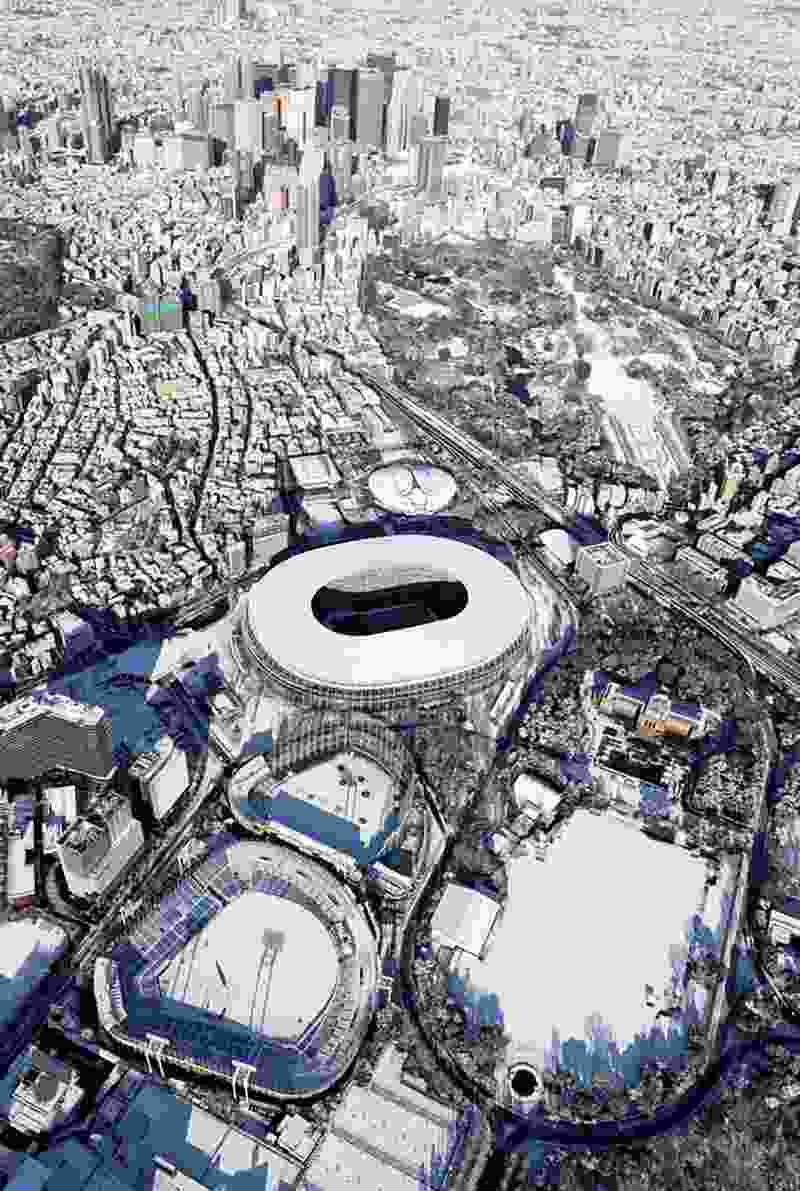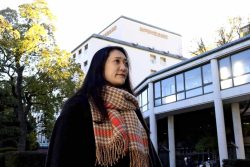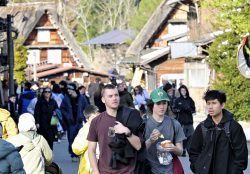
The Meiji Jingu Gaien area, which includes the National Stadium, center, is seen on Jan. 7.
11:04 JST, February 20, 2022
There is both hope and dissent over the planned redevelopment of the Meiji Jingu Gaien area, which includes the National Stadium that served as the main venue of the 2020 Tokyo Olympics and Paralympics.
The redevelopment is set to start this year, and while hopes are high that the area will become a new sports hub attracting visitors from Japan and abroad, some people are calling for a review of the plan as it involves cutting down about 1,000 trees, some over 100 years old.
The Tokyo metropolitan government’s council approved the urban development plan for the area on Feb. 9, giving the project the green light.
The redevelopment of the about 28-hectare area will be carried out by Mitsui Fudosan Co., Itochu Corp., the Meiji Jingu shrine and the Japan Sport Council. The aging Jingu Baseball Stadium and Prince Chichibu Memorial Rugby Stadium will be both demolished and rebuilt, and their locations switched. Two new high-rise buildings with offices and commercial facilities will be built, among other structures.
The project is set to be launched around the end of this year and completed by 2036.
The International Council on Monuments and Sites (ICOMOS) Japan — an organization that makes recommendations for the protection of cultural heritage — requested a revision to the plan after the metropolitan government released the draft in December.
According to the documents submitted by the developers to the metropolitan government, 971 of the 1,381 trees in the area will be cut down. Among the trees to be felled, 267 were in poor condition, the documents said.
Ginkgo trees that are part of the area’s well-known landscape will be kept, but trees slated to be cut down include some over 100 years old.
“Cutting down the trees is an act that hurts history and culture,” said Prof. Mikiko Ishikawa of Chuo University, who serves as a board member of ICOMOS Japan.
Other documents from the developers state that more trees will be planted than the number that will be cut down.
“We will examine the results of a survey by arborists and listen to their advice. We plan to preserve as many trees as possible while also creating new greenery,” a Mitsui Fudosan official said.
Meiji Jingu Gaien was established in 1926 as part of the shrine dedicated to Emperor Meiji. It was the first area to be designated under legislation as a scenic zone that requires preservation efforts.
“The creation of greenery is also important,” a metropolitan government official said. “We will ask the developers to take appropriate measures.”
"Society" POPULAR ARTICLE
-

Tokyo Zoo Wolf Believed to Have Used Vegetation Growing on Wall to Climb, Escape; Animal Living Happily after Recapture
-

JAL, ANA Cancel Flights During 3-day Holiday Weekend due to Blizzard
-

Snow Expected in Tokyo, Neighboring Prefectures from Jan. 2 Afternoon to Jan. 3; 5-Centimeter Snow Fall Expected in Hakone, Tama, and Chichibu Areas
-

Tokyo, Yokohama Observe First Snowfall of Season; 1 Day Earlier than Average Year
-

M6.2 Earthquake Hits Japan’s Tottori, Shimane Prefectures; No Tsunami Threat (Update 4)
JN ACCESS RANKING
-

Japan Govt Adopts Measures to Curb Mega Solar Power Plant Projects Amid Environmental Concerns
-

Core Inflation in Tokyo Slows in December but Stays above BOJ Target
-

Major Japan Firms’ Average Winter Bonus Tops ¥1 Mil.
-

Tokyo Zoo Wolf Believed to Have Used Vegetation Growing on Wall to Climb, Escape; Animal Living Happily after Recapture
-

JAL, ANA Cancel Flights During 3-day Holiday Weekend due to Blizzard
























